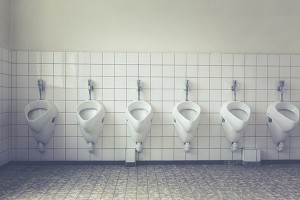“It takes a special sort of idiot, or a tourist, I suppose, to think it’s worth paying to urinate.”
 Jerusalem, January 11 – Confusion has reigned in Israel since the introduction of public toilet facilities that require payment for use, as the phenomenon has left them wondering why anyone would spend money on something that could be done in random locations anywhere.
Jerusalem, January 11 – Confusion has reigned in Israel since the introduction of public toilet facilities that require payment for use, as the phenomenon has left them wondering why anyone would spend money on something that could be done in random locations anywhere.
Clean, well-lit facilities in the capital’s Mahane Yehuda market opened two years ago, inviting marketgoers to spend a few shekels for the privilege of relieving themselves in a hygienic environment, but those facilities have since closed, and the space they occupy put up for lease. Nearby vendors explained that the pay restrooms saw infrequent use as shoppers and workers preferred to avail themselves of unused stalls, back alleys, or the free public restrooms at the other end of the outdoor complex when their bladders or bowels needed emptying.
“I don’t quite understand what they were for,” confessed Udi, who hawks halva two doors down from the site of the former pay toilets. “There are enough places to duck into and take a leak, or that have closed shutters that you can just go pee against. It takes a special sort of idiot, or a tourist, I suppose, to think it’s worth paying to urinate.”
Udi remembered only a handful of times people used the nearby pay toilets. “The city closed them down a couple of months ago, but not too long before that, I thought I saw someone go in the men’s restroom there,” he recalled. “But it turned out it was just a guy chasing after his toddler who had run under the turnstile.” The only previous user of the facilities he could remember with certainty was an American tourist so desperate to find a bathroom that she decided to pay the few shekels rather than walk another minute to either the free, less attractive public toilets, or find some semi-concealed corner of the nearby parking lot.
“I don’t get why there are public toilets at all,” remarked Abed, whose job for the Jerusalem Municipality requires him to clean the restrooms. “It would be much more sanitary, if you ask me, to have people go into an open field and bury their waste. I certainly don’t want to be cleaning up after you slobs. Have you any idea what ridiculous objects people have tried to flush down those toilets?”
His colleague Fadi interjected that people might as well leave their waste on the sidewalks and streets of the city, where it would remain indistinguishable from the copious quantities of dog feces adorning the surfaces.
Please support our work through Patreon.




